Paste Power Rankings: The 5 Best TV Shows Right Now, from P-Valley to Snowpiercer
Illustration by Christine Fernando and Soleil Collins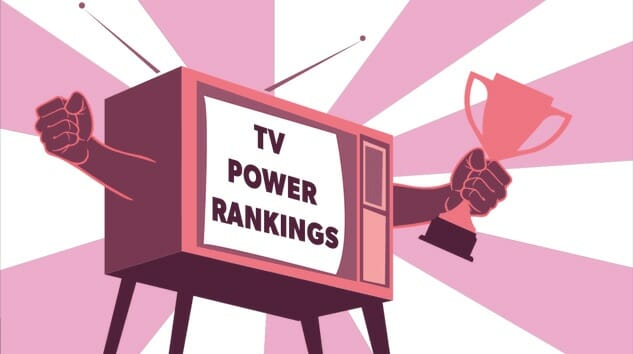
Something about Snowpiercer’s “eat the rich” messaging really spoke to us this week … although it was, regardless, an excellent double-episode finale. But joyful messages of friendship were also on our radar, as well as some more adult content on premium networks. Meanwhile, we’re gearing up for the launch of the new Peacock streaming service in the next few days. Will it be the TV savior of summer?
The rules for the Power Rankings are simple: Any current series on TV qualifies, whether it’s a comedy, drama, news program, animated series, variety show or sports event. It can be on a network, basic cable, premium channel, Netflix, Amazon, Hulu, YouTube or whatever you can stream on your smart TV, as long as a new episode was made available the previous week (ending Sunday) —or, in the case of shows released all at once, it has to have been released within the previous four weeks. The voting panel is composed of Paste Editors and TV writers with a pretty broad range of tastes.
Honorable Mention: Doom Patrol (DC Universe), I’ll Be Gone in the Dark (HBO), Agents of S.H.I.E.L.D. (ABC), Little Voice (Apple TV+), NOS4A2 (AMC)
5. I May Destroy You
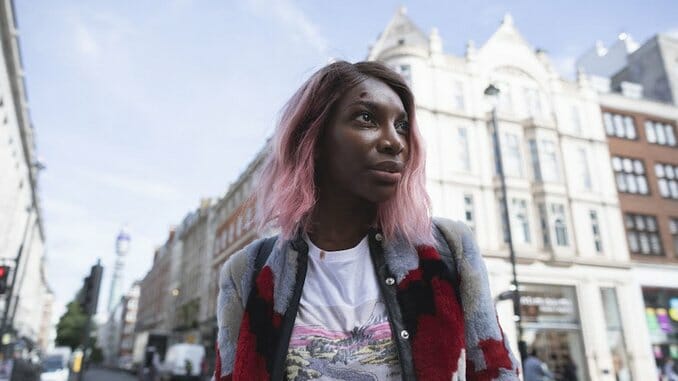
Network: HBO
Last Week’s Ranking: 2
This Week: An important message for anyone who has ever judged someone for being the victim of a sexual assault.
There may be few series as difficult but as important right now as Michaela Coel’s new 12-episode HBO show I May Destroy You. The Ghanaian-British creator and star explores the pain, confusion, and eventual road to healing regarding the rape experienced by her London-based lead, Arabella. Playing out as a series of vignettes, the season is tied together by a close-knit group of friends who must confront everything from their own biases to sexual crimes perpetrated against them.
Coel is taking on a lot here, and while the journey of these friends trying to make it can feel familiar, it’s coming to audiences from a new perspective—instead of young white adults in New York, we have young black adults in London. That distinction is important in a number of ways, and Coel also leans in to the Millennial nature of it all by showing Arabella’s obsession with her social media influence and ways she seeks to monetize without being exploited (which feels impossible). There’s also an early scene where a white casting director asks Terry if she’s wearing a wig, if she can wash it, and to please take it off to show them her “real” hair. The way Terry responds (hesitant, uncomfortable, and ultimately rebuffing) mirrors in some ways the moments of assault shown in the series. It upsets her but she tries to brush it off, much like everyone else responding to controlling or aggressive behavior.
All of this adds up to a weighty, ambitious attempt to wade through incredibly difficult subject matter, but one that also seeks to balance with earnest optimism and a desire for healing. There are many, many scenes of the friends just having fun, of getting annoyed with one another, of professing their undying love. That movement back and forth, to the past and present (to an imagined future), between feelings and experiences and traumas and desires, covers some of the series’ other uncertainties in ways that are both compelling and true. But more than anything, it’s a thought-provoking work that should make us consider our own relationship to trauma, experienced by ourselves or others, as well as hopefully this new cultural awakening to the many, many different kinds of sexual assault. —Allison Keene
4. Dirty John: The Betty Broderick Story
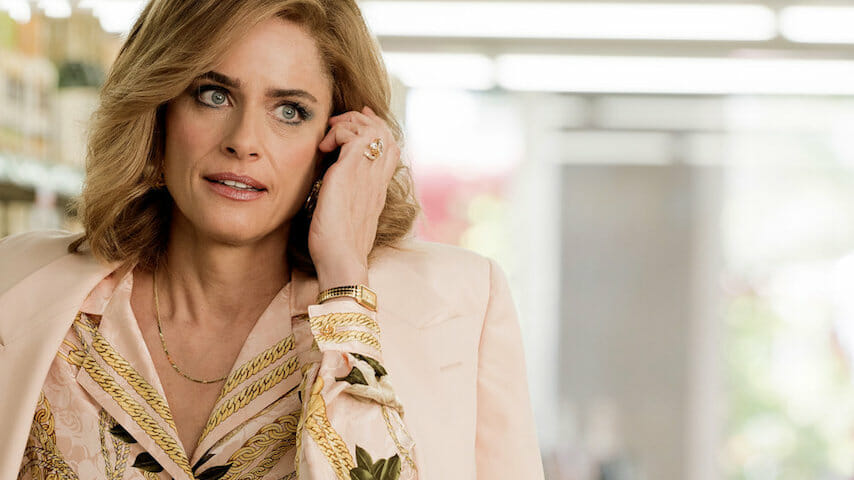
Network: USA
Last Week’s Ranking: Honorable Mention
This Week: Betty’s spiral into despair and despondency lead to an horrific tragedy— it’s also the role of Amanda Peet’s career.
Nothing excuses a double homicide. But the eight-part second season of Dirty John (now an anthology) begins to unravel what drove its lead to a violent act, and sheds light on the long-term effects of clinging to your anger and rage. Based on a true story, Betty Broderick (Amanda Peet) married Daniel Broderick (Christian Slater) when she was 19 years old. She had four children, suffered a still birth and a miscarriage, and worked multiple jobs to put him through medical school and law school. When Dan finally found success as a medical malpractice lawyer, he left Betty for Linda Kolkena (Rachel Keller), his much younger receptionist. He did this cruelly by denying for years that anything was going on between him and Linda, then by moving Betty into a new house under the ruse that they were all going to live their together. Dan was president of the San Diego Bar Association and used his legal connections to make it hard for Betty to find a lawyer. He also sent her to jail and put her in a psychiatric hold. When Linda moved in with him, before they were married, it was her voice Betty had to hear on the answering machine.
But this isn’t what people remember about the story. They may remember the 1992 made-for-TV movie staring Meredith Baxter. They may have listened to the L.A. Times podcast. They may recall the incessant vulgar messages Betty left on his answering machine and that she drove her car into his house. And they definitely remember that in November of 1989 Betty broke into Dan’s new home and killed Dan and Linda in their sleep.
Showrunner Alexandra Cunningham never forgets whose story she is telling, and Dirty John is the TV equivalent of a compelling page turner. From the Dynasty-esque outfits and hair to the fabulous 80s laden soundtrack, Cunningham peppers the series with wonderful ‘80s touches. There’s a certain camp to the series, but it never distracts from the central theme: That far too often our society casts a woman aside in favor of the man. And that’s the dirty truth. —Amy Amatangelo
3. P-Valley
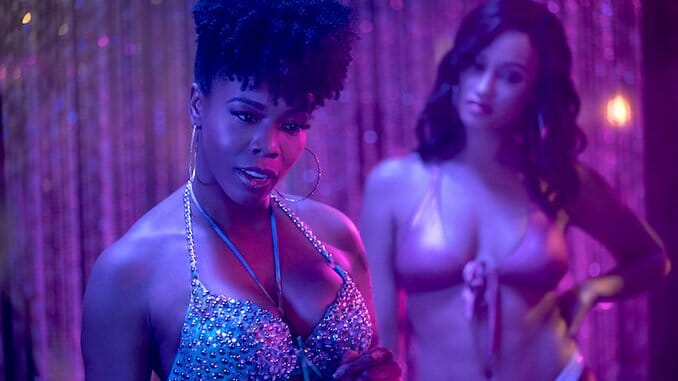
Network: Starz
Last Week’s Ranking: Not Eligible
This Week: Adult dancers of the Delta shine in this new series.
P-Valley takes place at a strip club deep in the Mississippi Delta and deals with the tough personalities who both run it and frequent it, but the show’s visual language is deeply feminine. Created and written by Olivier Award-winning playwright Katori Hall (based on her play, “Pussy Valley”), the eight-episode first season is also directed exclusively by women. And like Lorene Scafaria’s Hustlers, you can feel it.
The regulars of The Pynk are introduced to us fully formed: Mercedes (series’ breakout Brandee Evans) is the club’s star dancer, a tour de force who is ready to retire and start her own gym for girls; Uncle Clifford (Nicco Annan), the colorful owner who manages to dress more outrageously than any of his bejeweled dancers, is struggling to keep the club afloat; Keyshawn, a.k.a. Mississippi (Shannon Thornton) is a beauty on the rise but with an abusive partner; and a newcomer, Autumn Night (Elarica Johnson), is running from a traumatic past and looking to find her place among this odd family.
It’s easy to feel connected to P-Valley’s overall world and want the best for the women (and occasional men) who are trying to live on their own terms amid the neon lights and trap music bass lines. There’s also a naturalism to this rare, true working-class show that imbues it with a sly humor, like using funeral home bricks meant to pad out arrangements for a bag full of cash, or razzing the club’s cook for making chicken wings that give the dancers’ gas. P-Valley wants you know to know this place and the people who call it home in intimate ways—and not always through sex. P-Valley may or may not be the next Power, but it deserves to be; what it adds to the TV landscape is fresh, raw, and provocative in all of the right ways. —Allison Keene
2. The Baby-Sitters Club
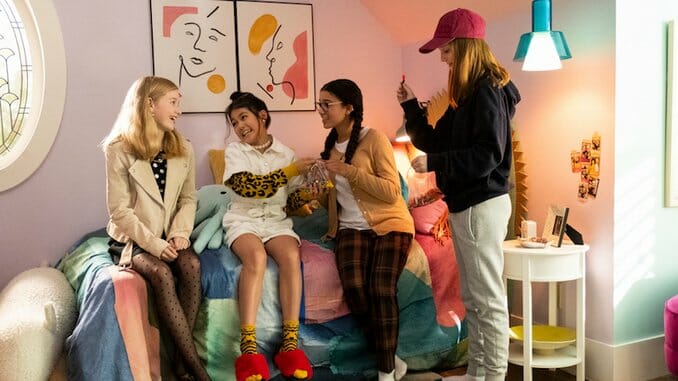
Network: Netflix
Last Week’s Ranking: 1
This Week: Warm, lovely, perfect; full of moving stories of friendship without flattening any personalities or the emotional pains of being in middle school.
Longtime fans of Ann M. Martin’s The Baby-Sitters Club, a chapter book series whose late ‘80s/early ‘90s aesthetic is so iconic Scholastic sells a tin-boxed set of original covers, will be understandably skeptical of Rachel Shukert’s upcoming Netflix adaptation. It seems impossible, after all, that anyone could pluck Kristy, Mary-Anne, Claudia, Stacey and Dawn from their perch in Claudia’s pre-Y2K bedroom, drop them square in the age of Instagram, and not lose something in the translation. I mean, the whole idea behind the Baby-Sitters Club—five girls gathering around a landline phone for half an hour, once per week, to field neighborhood baby-sitting requests as a quasi-socialist collective—is just so deeply analog. And 2020? It’s just so… not.
Well, I am happy to report: Skeptics need not fear. As clever, tender, and earnest as you remember The Baby-Sitters Club books to have been whenever you first read them, Shukert’s vision more than rises to the challenge. Between her confident translation of Martin’s original characters, the natural-but-goofy cinematic language brought to the table by Lucia Aniello and a raft of other (mostly female) directors, plus the endless charm of the series’ young core cast, this newest adaptation is a dream. Like its namesake, The Baby-Sitters Club (Netflix edition) is funny, sweet, and emotionally complex. Just as importantly, though, it implicitly understands the ways in which Kristy’s retro baby-sitting club business model is a perfect analog solution to a whole sea of problems caused by digital technology(/the gig economy)’s stranglehold over modern society.
Smartly, one thing Shukert doesn’t update in this adaptation are the structural elements most signature to the original series. Of the ten episodes the comprise Season 1, the first eight mirror their chapter book counterparts, alternating between the five core sitters’ perspectives, with two episodes each being told from Kristy, Claudia and Stacey’s points of view, and one each from Mary-Anne and Dawn’s. The two-part season finale, meanwhile, mirrors the super-sized Super Special books that functioned, in the original, as a series within a series, taking the girls away from their baby-sitting duties and letting them share the narrative focus equally. For readers, these Super Specials were objects of intense anticipation; for viewers, following Elizabeth and Watson’s big wedding celebration in Episode 8, “Welcome to Camp Moosehead” (Parts 1 & 2) caps off what was already a narratively complete season in the most emotionally satisfying way. Should the pop culture fates conspire in our favor, though, this will be just the first of many clever and tender seasons of The Baby-Sitters Club to come. —Alexis Gunderson
1. Snowpiercer
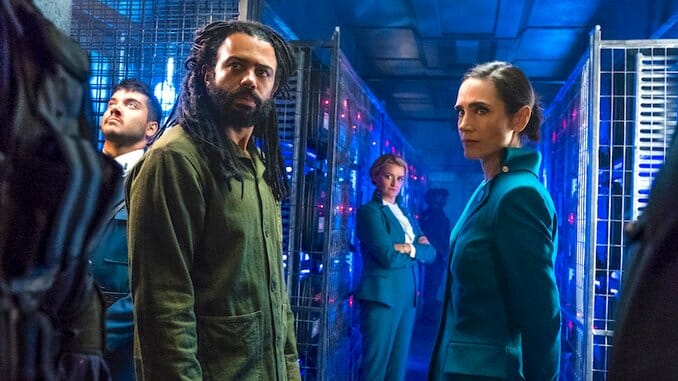
Network: TNT
Last Week’s Ranking: 4
This Week: Daveed Diggs rallying the people of the Tail (“One train!”) is what 2020 needed.
The most unsettling thing about watching a show about a post-apocalyptic future during a pandemic is that even the most random details hit a little too close to home. At one point during TNT’s new series, Snowpiercer, head of hospitality Melanie (a perfectly cast Jennifer Connelly) asks one of the train’s conductors, “Do you remember fresh air? Do you remember going for walks?” to which he responds, after a thoughtful pause, “Rain. I miss the sound of rain.”
The premise for the series is that in the not-too-distant future, climate change has taken a turn for the worse, and scientists attempting to counteract the damage humanity has enacted upon our planet accidentally freeze the world instead. A supposedly forward-thinking “visionary” named Mr. Wilford predicts the coming disaster, and builds a train 1,001 cars long that will house all of Earth’s last remaining citizens, circling the globe without an end in sight. As is the case with society itself, the train is divided into various classes—first, second, third, and the tail—each defined by varying degrees of privilege and poverty. The story is based on the French graphic novel Le Transperceneige, originally published in 1982; Oscar winner Bong Joon-Ho adapted it into a star-studded, big-screen action flick in 2013 (see: Chris Evans, Octavia Spencer, Tilda Swinton, and Song Kang-Ho).
In place of Bong’s Hollywood action hero Evans, the TV series enlists Hamilton star Daveed Diggs as Andre Layton, the reigning leader of the mistreated “tailies” section of the train. Instead of a more straightforward rebellion pushing Evans’ Curtis from the tail to the front of the train, the series takes advantage of its multi-chapter format to present a complex web of lies, false identities, and complicity.
It’s important to note here that when Bong’s film was released in 2013, the world was a much different place. Snowpiercer, the movie, felt prophetic, like a warning of what could happen if humans continued to allow capitalistic impulses guide our decisions. But the TV series isn’t prophetic. It’s a mirror. What happens when there is less to learn from the allegory than from reality itself? When simile becomes metaphor? It’s not that the society we live in is like the fictional world of Snowpiercer; it’s that the society we live in is Snowpiercer. —Joyce Chen
For all the latest TV news, reviews, lists and features, follow @Paste_TV.







































